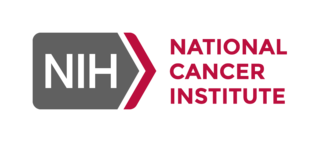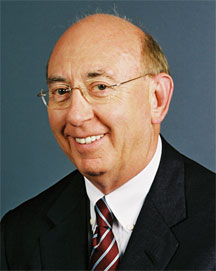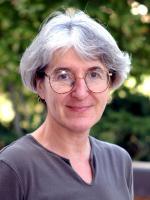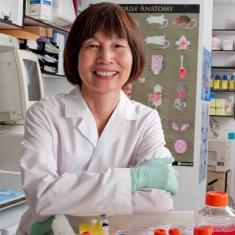
The National Cancer Institute (NCI) coordinates the United States National Cancer Program and is part of the National Institutes of Health (NIH), which is one of eleven agencies that are part of the U.S. Department of Health and Human Services. The NCI conducts and supports research, training, health information dissemination, and other activities related to the causes, prevention, diagnosis, and treatment of cancer; the supportive care of cancer patients and their families; and cancer survivorship.

Roxana Moslehi is an Iranian genetic epidemiologist.

Joseph F. Fraumeni Jr. is an American physician and cancer researcher. Born in Boston, he received an A.B. from Harvard College, an M.D. from Duke University, and an M.Sc. in epidemiology from the Harvard School of Public Health. He completed his medical residency at Johns Hopkins Hospital and Memorial Sloan-Kettering Cancer Center. He then joined the National Cancer Institute at the National Institutes of Health in 1962 as a commissioned officer of the U.S. Public Health Service, becoming the founding Director of the Division of Cancer Epidemiology and Genetics in 1995. He stepped down from this position in 2012 to become a senior investigator and advisor to the National Cancer Institute.

Edison T. Liu, M.D., is the president and CEO of The Jackson Laboratory, and was the president of Human Genome Organization, HUGO from 2007-2013.

John E. Niederhuber, MD was the 13th director of the National Cancer Institute (NCI), from 2006 until July, 2010, succeeding Andrew von Eschenbach, who went on to become a director at biotechnology firm BioTime. A nationally renowned surgeon and researcher, Dr. Niederhuber has dedicated his four-decade career to the treatment and study of cancer - as a professor, cancer center director, National Cancer Advisory Board chair, external advisor to the NCI, grant reviewer, and laboratory investigator supported by NCI and the National Institutes of Health. He is now Executive Vice President/CEO Inova Translational Medicine Institute and Inova Health System and Co-Director, Johns Hopkins Clinical Research Network.

Christopher G. Chute is a Bloomberg Distinguished Professor at Johns Hopkins University, physician-scientist and biomedical informatician known for biomedical terminologies and health information technology (IT) standards. He chairs the World Health Organization Revision Steering Group for the revision of the International Classification of Diseases (ICD-11).
Sanjay Shete is a Professor in Statistical Genetic, Genetic Epidemiology, Behavioral genetics and Biostatistics at The University of Texas MD Anderson Cancer Center. He is Barnhart Family Distinguished Professor in Targeted Therapies and Section Chief of Behavioral and Social Statistics in the division of Quantitative Sciences.

Dr. Moyses Szklo is a Brazilian epidemiologist and physician scientist. He is currently University Distinguished Service Professor of Epidemiology and Medicine at the Johns Hopkins University, Editor-in-chief of the American Journal of Epidemiology, and director of the Johns Hopkins Summer Institute of Epidemiology and Biostatistics. Szklo has published over 300 articles in peer-reviewed journals as well as a major textbook of epidemiology. He has led several major epidemiologic societies and studies and has been lecturing and leading courses all over the world, including Spain, Italy, Israel, Brazil, and Mexico.

Nilanjan Chatterjee is a Bloomberg Distinguished Professor of Biostatistics and Genetic Epidemiology at Johns Hopkins University, with appointments in the Department of Biostatistics in the Bloomberg School of Public Health and in the Department of Oncology in the Sidney Kimmel Comprehensive Cancer Center in the Johns Hopkins School of Medicine. He was formerly the chief of the Biostatistics Branch of the National Cancer Institute's Division of Cancer Epidemiology and Genetics.

Elaine Ann Ostrander is an American geneticist at the National Human Genome Research Institute (NHGRI) of the National Institutes of Health (NIH) in Bethesda, Maryland. She holds a number of professional academic appointments, currently serving as Distinguished and Senior Investigator and head of the NHGRI Section of Comparative Genomics; and Chief of the Cancer Genetics and Comparative Genomics Branch. She is known for her research on prostate cancer susceptibility in humans and for conducting genetic investigations with the Canis familiaris, the domestic dog model, which she has used to study disease susceptibility and frequency and other aspects of natural variation across mammals. In 2007, her laboratory showed that much of the variation in body size of domestic dogs is due to sequence changes in a single gene encoding a growth-promoting protein.

Stephen Jacob Chanock (born April 15, 1956) is an American physician and geneticist. He currently serves as Director of the Division of Cancer Epidemiology and Genetics at the U.S. National Cancer Institute (NCI)1.
Ethel S. Gilbert is an American biostatistician and an expert in the risks of radiation-induced cancer, including cancers in nuclear workers and second cancers in radiation therapy patients.

Lauren Anne Wise is a Canadian-American epidemiologist and Professor in the Department of Epidemiology at Boston University School of Public Health.

Donna Day Baird is an American epidemiologist and evolutionary-population biologist. She is a senior investigator at the National Institute of Environmental Health Sciences.

Gretchen L. Gierach is an American epidemiologist and women's health researcher. She is the Deputy Chief of the Integrative Tumor Epidemiology Branch in the National Cancer Institute.

Amy Berrington de González is a scientist. She is a senior investigator and radiation epidemiology branch chief at the National Cancer Institute.

Elizabeth "Lisa" Khaykin Cahoon is a Georgian-born American epidemiologist researching cancer and precancer risks conferred by environmental sources of radiation exposure. She is a Stadtman investigator at the National Cancer Institute.

Sheue-yann Cheng is an American molecular geneticist who pioneered the development of mouse models to understand the molecular basis of diseases due to mutations of thyroid hormone receptors. Cheng is a senior investigator at the National Cancer Institute and chief of the gene regulation section.

Jacqueline Jia-Kang Whang-Peng is a Taiwanese-American physician-scientist specialized in cytogenetics of cancer, as well as medical genetics, genetic oncology, and gene mapping. She was a researcher at the National Cancer Institute from 1960 to 1993.

Xiaohong Rose Yang is an American biomedical scientist researching the genetics of dysplastic nevus syndrome and chordoma, and etiologic heterogeneity of breast cancer. She is a senior investigator at the National Cancer Institute. Yang leads breast cancer studies in mainland China, Hong Kong, and Malaysia.



















